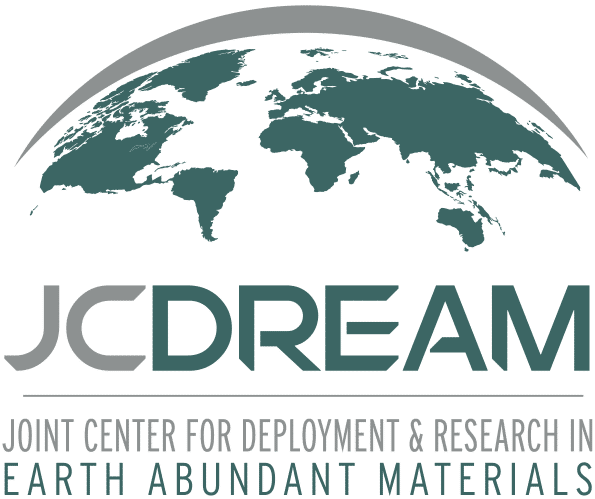We are thrilled to announce the 2019 JCDREAM Seed Grant Awardees. The winners come from a range of institutions throughout the state of Washington. Their projects cover earth-abundant materials science from a variety of angles. We look forward to seeing the results of their research.
1. Materials Washington
Materials Washington will be an alliance of community and technical colleges working collaboratively with industry, policymakers, and professional associations to advance Washington’s leadership role in the global materials environment. The collaboration will enhance the competitiveness of Washington’s materials technicians and engineering workforce by providing innovative training and education using materials focused modules and state-of-the-art technology.
This project will use JCDREAM funding to establish the Materials Washington consortium and develop two modules that will become the foundation of future public and professional development opportunities and education and training. The project team plans to use the modules as an avenue to offer professional development opportunities to secondary and post-secondary educators, industry, and other stakeholders.
Principal Investigator: Mel Cossette | National Resource Center for Materials Technology Education, Edmonds Community College
Principal Investigator: Ann Avary | Center of Excellence for Maritime Manufacturing and Technology, Skagit Valley College
Industrial Collaborator: George Parker | Boeing
2. Spectroscopic Ellipsometer
The spectroscopic ellipsometer will be used to determine the optical properties and molecular orientation in organic photovoltaics. Organic photovoltaics (OPVs) have enormous potential as an earth-abundant renewable energy technology, but their performance and reproducibility in a scalable manufacturing platform are not yet competitive. The spectroscopic ellipsometer quantitatively measures refractive index and extinction coefficients across the UV-vis-NIR spectral range. From this information, dielectric properties, conductivity, and complex absorbance effects can be extracted. For coatings, film thickness can be accurately measured from sub-monolayer to tens of microns and can even be applied to absorbing materials and multilayered structures.
Principal Investigator: Brian Collins | Washington State University, Department of Materials Science & Engineering
3. Recycling of Aerospace Thermoplastic Composites
The future of sustainable air transport technologies such as electric and short-range aircraft depends on significantly reducing the weight of aerostructures. Light-weighting will require utilization of fewer metallic components and demand further development and adoption of earth-abundant materials like carbon fiber reinforced polymer (CFRP) composites. Thermoplastic composites (TPCs) are an excellent light-weighting solution with superiour impact- and fracture-resistance, but are more expensive and therefore less commonly used. Cost reduction and widespread implementation of TPCs can be realized through recycling of TPC materials. This project will purchase a high temperature compression molding machine to study the properties and processability of recycled TPCs to further reduce the need for critical metallic materials commonly used in aerospace.
Principal Investigator: John Misasi, PhD | Western Washington University, College of Science & Engineering
Industrial Collaborator: Robert Kearney | Boeing
4. Center for Rational Catalyst Synthesis
Catalysis is a hidden but high-impact science at the heart of the energy, chemical and environmental industries. About 20% of the world’s economy depends directly or indirectly on catalysis. Despite their immense importance, the development of new heterogeneous catalysts is still largely empirical, particularly at the stage of synthesis. The Center for Rational Catalyst Synthesis (CeRCaS) is the world’s first and only research center focusing on transforming the art of catalyst preparation into a science.
To date, virtually all commercially employed catalysts are based on rare, precious metals. CeRCaS focuses mainly on the rational design of catalysts using earth-abundant materials. It currently has two nodes with a third in progess. This seed grant will assist in establishing a fourth node at Washington State University focusing on electrocatalysts and emission exhaust catalysts, which are both important in the transportation sector.
Principal Investigator: Jean-Sabin McEwen, PhD | Washington State University, School of Chemical Engineering and Bioengineering
Principal Investigator: Su Ha, PhD | Washington State University, School of Chemical Engineering and Bioengineering
Industrial Collaborator: Cynthia Webb | PACCAR
5. Solubility Optimization of Organic Redox Flow Battery Electrolytes
Redox flow batteries (RFB) promise to significantly reduce grid-scale energy storage costs and to accelerate adoption of transient renewable energy sources such as wind and solar. The vanadium RFB (VRFB) leads in market adoption due to its long-term stability, proven performance and efficiency. Since vanadium is a critical material, the reliability of its supply inhibits VRFBs ability to be deployed at scale. Organic electrolytes, which are synthetically produced from earth-abundant elements, present an alternative for wide-scale deployment of RFBs.
This seed grant will purchase a multi-mode spectrophotometer to be used in combination with an existing cluster of robotic tools to formulate and test ORFB electrolytes based on redox-active organic molecules. It will be used specifically to measure and optimize the solubility and stability of organic redox species in electrolytes at variable conditions.
Principal Investigator: Lilo Pozzo, PhD |University of Washington, School of Chemical Engineering
Principal Investigator: Wei Wang, PhD | Pacific Northwest National Laboratory, Battery Materials & Systems Group
Industrial Collaborator: Greg Newbloom | Membrion
6. Cycloturbine Research
Modern wind turbines require a great deal of rare earth metals. If the efficiency of turbines can be increased, less rare earth metals will be required to produce the same amount of energy. The WSU Wind Engineering Team is conducting research into cycloturbines, a wind turbine that has a higher theoretical maximum efficiency than traditional horizontal axis wind turbines. Optimization of cycloturbines could result in a 25% deduction in rare earth element usage in wind due to increased efficiency and reduced equipment production.
This seed grant will fund the purchase of an educational wind tunnel for researching cycloturbine performance. The WSU Wind Engineering team is a collaboration between WSU Everett, Everett Community College (EvCC) and the Advanced Manufacturing Training and Education Center (AMTEC).

